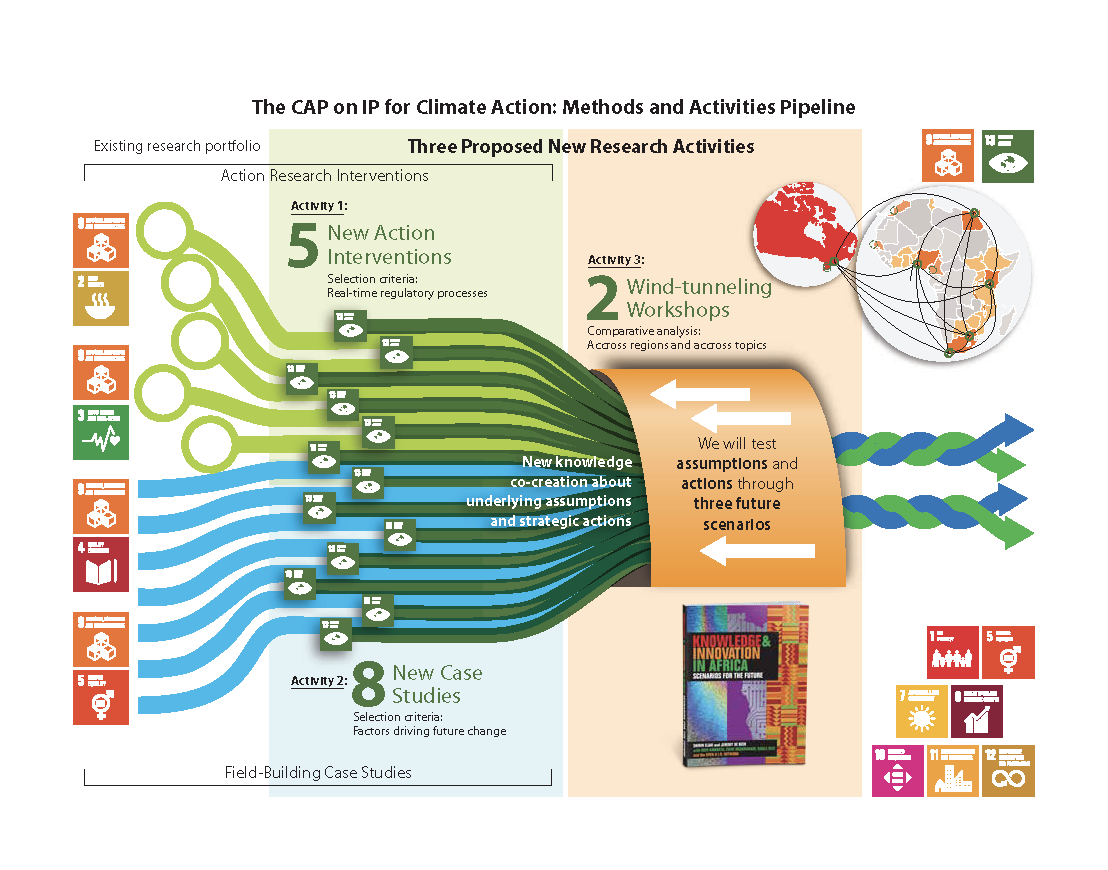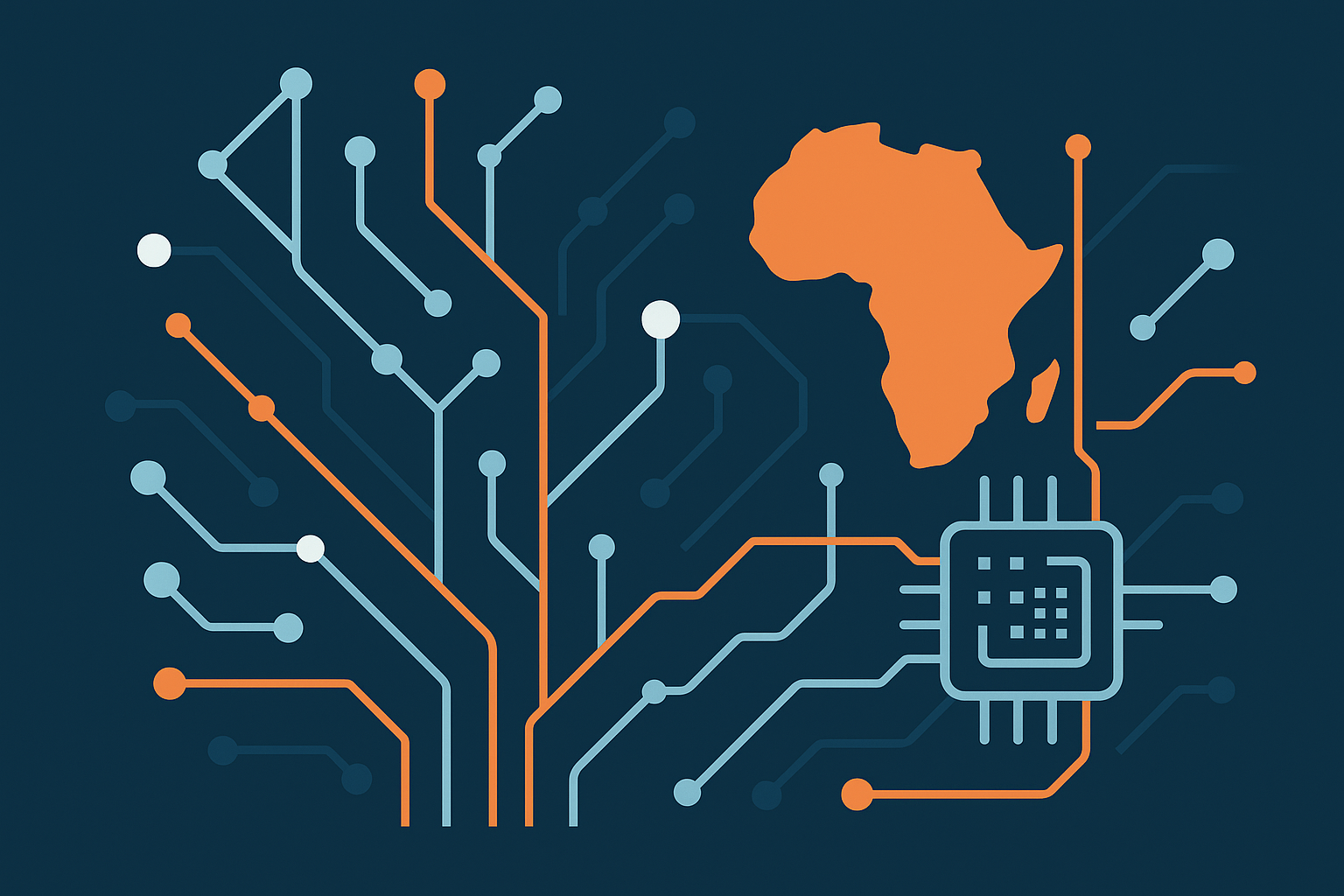The global response to climate change depends on the rapid development and equitable diffusion of clean technologies. Achieving these objectives requires innovation systems that not only stimulate technological progress but also ensure that the benefits of innovation are shared widely. Yet, existing intellectual property (IP) regimes are often poorly aligned with this goal. The Canada–Africa Partnership on Intellectual Property (CAP on IP) for Climate Action investigates how IP frameworks can be better designed, interpreted, and implemented to support climate action and equitable development.
This seven-year project (2025–2032) is part of the Open African Innovation Research (Open AIR) network. It is funded through a major Partnership Grant from the Social Sciences and Humanities Research Council of Canada (SSHRC), with additional contributions from partner institutions in Africa and Canada.
Context and Rationale
Climate change represents a defining challenge for innovation and governance. The technologies required to mitigate and adapt to its effects—such as renewable energy, sustainable agriculture, carbon capture, and green manufacturing—are emerging rapidly. However, the pathways through which these technologies are created, owned, and shared are governed by systems of law and policy that were designed for a different era.
The classic assumption underlying IP regimes is that exclusive rights provide necessary incentives for innovation, with social benefits accruing over time. Experience has shown, however, that this model often reproduces inequities. During the COVID-19 pandemic, for example, exclusive control over vaccine technologies constrained equitable access and undermined global solidarity. Similar patterns can already be observed in climate-related innovation.
CAP on IP for Climate Action responds to this tension by asking how IP can contribute to, rather than inhibit, the development and diffusion of clean technologies. The project’s central hypothesis is that IP systems, when governed effectively and inclusively, can be harnessed to accelerate innovation while ensuring that its outcomes are aligned with the Sustainable Development Goals (SDGs), particularly SDG 13: Take urgent action to combat climate change and its impacts.
Objectives and Conceptual Framework
The project’s overall objective is to generate and mobilise new knowledge about the role of IP in inclusive, sustainable innovation for climate action. The work proceeds from the recognition that the global IP system is complex, multi-level, and contested. Its rules are not neutral but embedded within broader political and economic structures that shape innovation outcomes.
Building on more than fifteen years of Open AIR research, the project explores three interrelated pathways for reform and experimentation:
- Working within IP systems to improve their operation and alignment with climate objectives, including through more effective licensing practices, policy coherence, and institutional capacity.
- Working around IP systems to identify and strengthen alternative models such as open licensing, collaborative innovation, and community-based knowledge sharing.
- Working despite IP systems to address circumstances in which existing rules and institutions systematically block equitable access or inhibit innovation, and to propose policy options for change.
These pathways are connected by a cross-cutting emphasis on openness, equity, and collaboration between Canada and African partners.
Research Design and Methods
CAP on IP for Climate Action employs a mixed-method, comparative design linking empirical research, policy analysis, and collaborative experimentation. Three primary research activities structure the work.
Action research interventions: Five real-time interventions will engage directly with policy processes in international and regional fora. These will include collaborations with organisations such as the World Intellectual Property Organization (WIPO), the World Trade Organization (WTO), and the United Nations Framework Convention on Climate Change (UNFCCC). Each intervention will co-produce research and policy recommendations with decision-makers, ensuring that findings inform practice as they emerge.
Case studies: Eight multi-disciplinary case studies will examine clean technology innovation in different sectors and contexts, including renewable energy, sustainable agriculture, and waste management. The focus will be on innovation that occurs around and despite the constraints of the existing IP system, documenting how local actors adapt, negotiate, and transform rules to achieve social and environmental goals.
Wind-tunnelling workshops: Comparative, forward-looking workshops will bring together project partners and stakeholders to test assumptions, evaluate policy options, and model potential impacts. Building on Open AIR’s continuing work with strategic foresight tools, the “wind-tunnelling” exercises will apply these methods to explore future scenarios and chart options for adaptive governance.
Expected Outcomes
Over seven years, the project will contribute to the evidence base on how IP can be governed in ways that advance both innovation and equity. Key outcomes include:
- New conceptual frameworks for understanding the relationship between IP and climate innovation in different institutional settings.
- Empirical findings on how IP operates within cleantech ecosystems across Africa and Canada.
- Policy and legal recommendations to improve coherence between IP governance and climate objectives at national and international levels.
- Strengthened capacity among researchers, policymakers, and innovators to apply these findings in practice.
The project is expected to produce approximately 1,150 research outputs, including peer-reviewed publications, policy briefs, reports, and media materials. It will also train and mentor more than 130 researchers—postdoctoral fellows, doctoral and master’s students, and undergraduates—through direct participation in research and collaborative activities.
Partnership and Governance
CAP on IP for Climate Action is coordinated by the Open AIR network, which connects researchers and institutions across Africa and Canada. Prof. Jeremy de Beer is the Director, administering the project with Co-director Dr. Chidi Oguamanam principally from the University of Ottawa Centre for Law, Technology, and Society.
The work involves other principal investigators and co-investigators based at partner institutions in South Africa, Egypt, Kenya, Nigeria, and Canada: Alexandra Mogyoros (Toronto Metropolitan University), Bassem Awad, (Western University), Caroline Ncube (University of Cape Town), Chijioke Okorie (University of Pretoria), Desmond Oriakhogba (University of the Western Cape), Erika Kraemer-Mbula (University of Johannesburg), Florian Martin-Bariteau (University of Ottawa), Melissa Omino (Strathmore University), Nagla Rizk (American University in Cairo), Tesh Dagne (York University), and Tobias Schonwetter (University of Cape Town).
The project involves a wide network of collaborators from academia, government, industry, and civil society, whose combined expertise ensures that the research remains empirically grounded, policy-relevant, and responsive to the needs of diverse innovation communities across Africa and Canada. Additional partners and collaborators will join during the life of the project as new research nodes are established.
The governance model follows Open AIR’s established practice of distributed leadership, combining academic rigour with practical engagement. Each partner institution contributes specific expertise and regional insights. Activities are organised through thematic working groups and overseen by a steering committee that ensures coherence across the research portfolio.
Relationship to Open AIR’s Broader Research
This project represents a continuation of Open AIR’s long-term agenda on openness, collaboration, and the governance of knowledge. It builds on earlier work demonstrating how intellectual property, data, and knowledge systems can be governed in more inclusive ways to support innovation in Africa and beyond.
The CAP on IP for Climate Action project complements and interacts with other current Open AIR initiatives, including those on artificial intelligence governance and regulation for innovation. Together, these projects constitute a coherent portfolio addressing how law and policy shape the conditions for sustainable and equitable innovation.
Significance
By analysing and testing how IP can be used more effectively in the service of climate action, this project contributes to both scholarship and practice. It demonstrates that IP systems are not inherently barriers or enablers, but instruments whose effects depend on how they are designed, interpreted, and applied. The project’s findings will inform debates on climate technology transfer, open science, and the governance of innovation under the Paris Agreement.
Through its collaborative structure, CAP on IP for Climate Action aims to strengthen the capacity of institutions in Africa and Canada to engage in evidence-based policymaking on IP and climate issues. The ultimate objective is to contribute to a more balanced and inclusive global framework for innovation that supports the urgent imperatives of climate action and sustainable development.







